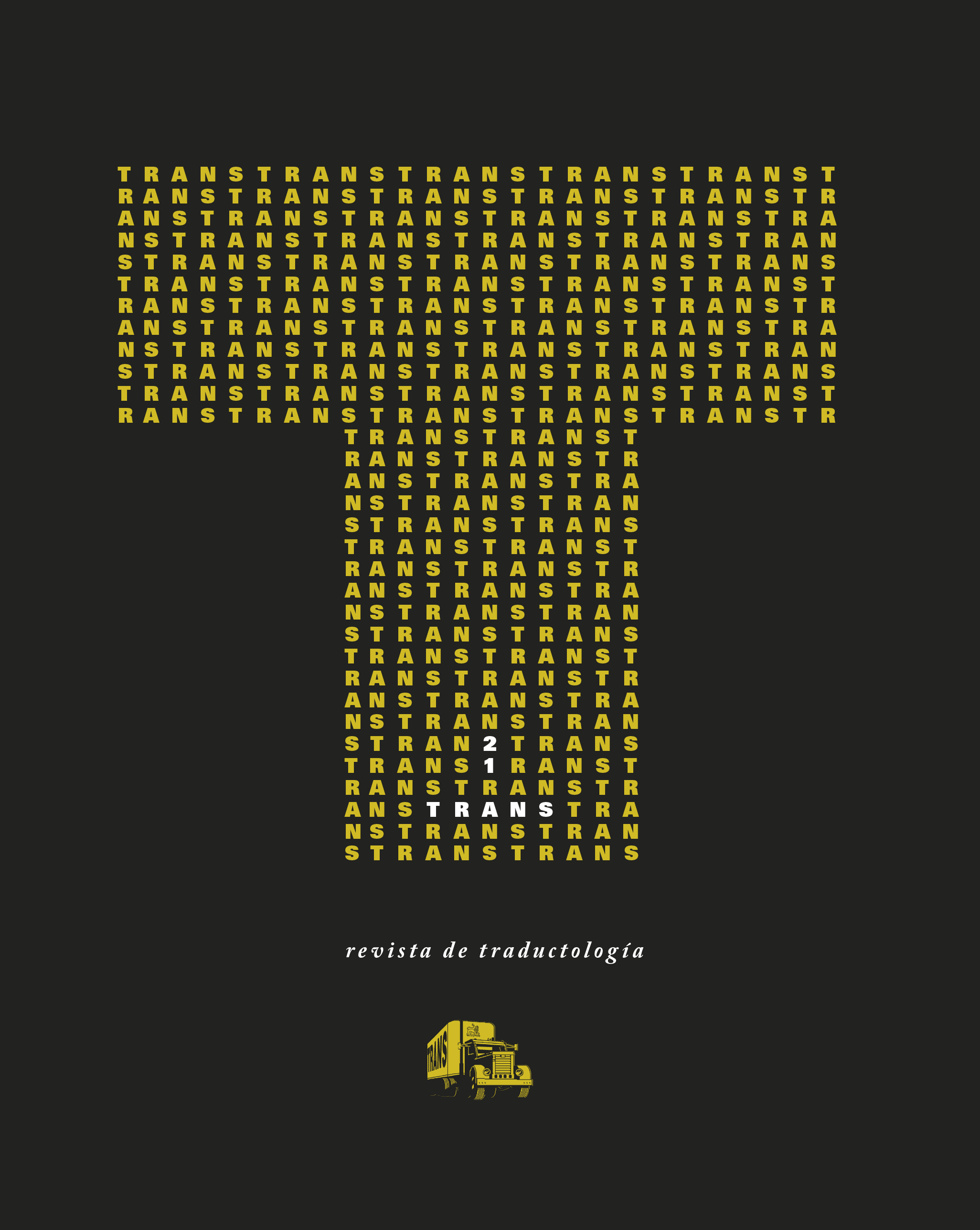The work of the nineteenth century translator according to himself: analysis of the paratext from two translations of Os Lusíadas into French (1825 et 1842)
DOI:
https://doi.org/10.24310/TRANS.2017.v0i21.3652Keywords:
Camoens, Translation history, Literary translation, AdaptationAbstract
The nineteenth century in France is described by researchers as a time of transition from the tradition of the belles infidèles to a translation model closer to the source text. This article studies two cases which contradict this tendency. Our starting point will be the analysis of the texts written by the translators Jean-Baptiste Millié and François-Félix Ragon for two translations into French of Os Lusíadas, by the Portuguese author Luis Vaz de Camões, in1825 and 1842, respectively. These texts are first hand testimonies, where translators expose their conception of translation, their translation strategies and their perception of Portuguese literature and of the work of Camões.Downloads
Metrics
Publication Facts
Reviewer profiles N/A
Author statements
Indexed in
-
—
- Academic society
- N/A
- Publisher
- Universidad de Málaga
References
Bastin, Georges (1993) : La notion d’adaptation en traduction. Meta, XXXVIII, 3, 473-478.
Bastin, Georges (2005) : « Adaptation », en Mona Baker, ed. Routledge encyclopedia of translation studies, Londres, New York: Routledge, 5-8.
Berman, Antoine (1990) : « La retraduction comme espace de la traduction ». Palimpsestes nº4. Paris: Publications de la Sorbonne Nouvelle, 1-8.
Camões, Luís Vaz (1826) : The Lusiad, an epic poem, by Luis de Camoens, translated from the Portugueze by Thomas Moore Musgrave (Traduit par Thomas Moore Musgrave), Londres : John Murray.
Chevrel, Yves, D’Hulst, Lieven, Lombez, Christine (dir.) (2012) : Histoire des traductions en langue française – xixe siècle (1815-1914), Paris : Verdier.
D’Hulst, Lieven (1990) : Cent ans de théorie française de la traduction, de Batteaux à Littré, (1748-1847), Lille : Presses Universitaires de Lille.
Even-Zohar, Itamar (2000): «The position of translated literature within the literary polysystem» en Lawrence Venuti (ed.) The translation studies reader, Londres, New York : Routledge, 192-197.
Kahn, Robert y Catriona Seth (2010) : « Avantpropos: une fois ne suffit pas » en Robert Kahn, Catriona Seth (dir.) La retraduction, Mont-Saint-
Aignan : Publication des Universités de Rouen et du Havre.
Lefevere, André (2003) : «Introduction» en André Lefevere (ed.) Translation, history, culture, Londres, New York : Routledge, 1-13.
Machado, Álvaro Manuel (1983): O «Francesismo» na literatura portuguesa, Lisbonne : Ministério da Educação. Instituto do Livro e da Cultura.
Quint, Anne-Marie (2011): «Receção de Camões na literatura francesa» en Vítor Aguiar e Silva (coord.) Dicionário de Luís de Camões, Lisbonne: Editorial Caminho, 796-806.
Salamar-Carr, Myriam (2005) : «French tradition» en Mona Baker, ed., Routledge encyclopedia of translation studies, Londres, New York: Routledge, 409-415.
Sousa, Maria Leonor Machado (1992) : «Apresentação» en Maria Leonor Machado Sousa, (coord.) Camões em Inglaterra, Lisbonne: Ministério da Educação, Instituto do Livro e da Cultura, 6-8.
Stäel, Mme de (1821) : « De l’esprit des traductions » en OEuvres complètes de Mme la Baronne de Staël, tome XVII, Paris: L’imprimerie de Plassan, 375-386.
Steiner, Georges (1998) : After babel, Oxford : Oxford University Press.
Vrinat-Nikolov, Marie (2006) : Miroir de l’altérité. La traduction, Grenoble : ELLUG.
Downloads
Published
How to Cite
Issue
Section
License
All contents published in TRANS. Revista de Traductología are protected under the Creative Commons Attribution-NonCommercial-ShareAlike 4.0 International (CC BY-NC-SA 4.0) license. All about this license is available in the following link: <http://creativecommons.org/licenses/by-nc-sa/4.0>
Users can copy, use, redistribute, share and exhibit publicly as long as:
- The original source and authorship of the material are cited (Journal, Publisher and URL of the work).
- It is not used for comercial purposes.
- The existence of the license and its especifications are mentioned.
- ShareAlike — If you remix, transform, or build upon the material, you must distribute your contributions under the same license as the original.
There are two sets of authors’ rights: moral and property rights. Moral rights are perpetual prerogatives, unrenounceable, not-transferable, unalienable, imprescriptible and inembargable. According to authors’ rights legislation, TRANS. Revista de Traductología recognizes and respects authors moral rights, as well as the ownership of property rights, which will be transferred to University of Malaga in open access.
The property rights are referred to the benefits that are gained by the use or the dissemination of works. TRANS. Revista de Traductología is published in an open access form and it is exclusively licenced by any means for doing or authorising distribution, dissemination, reproduction, , adaptation, translation or arrangement of works.
Authors are responsable for obtaining the necessary permission to use copyrighted images.













21.png)
